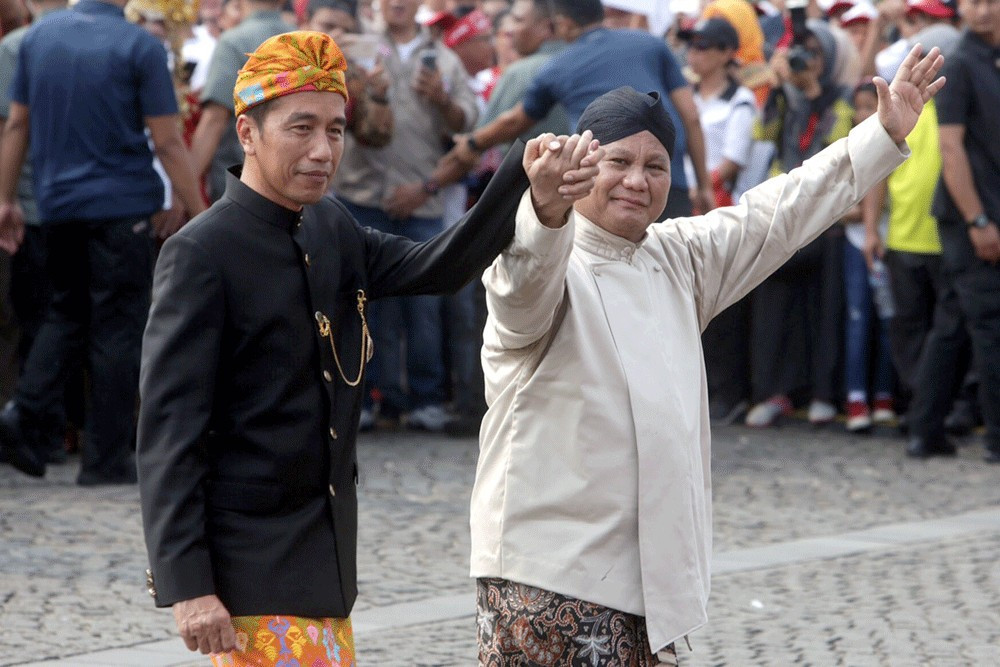News
Shadow leadership, Jokowi’s attempt to cling to power
Tenggara Strategics April 30, 2025 Clean campaign: President Joko “Jokowi” Widodo (left) and his challenger in this year’s presidential election, Prabowo Subianto, walk hand-in-hand during an event held in Jakarta on Sept. 23, 2018, in which they vowed to combat hoaxes and ethnic, religiou
Clean campaign: President Joko “Jokowi” Widodo (left) and his challenger in this year’s presidential election, Prabowo Subianto, walk hand-in-hand during an event held in Jakarta on Sept. 23, 2018, in which they vowed to combat hoaxes and ethnic, religiou
The influence of former president Joko ‘’Jokowi’’ Widodo on the government of his successor President Prabowo Subianto looks to remain intact, despite the former’s promise to stop creating an image of shadow leadership in the country.
The phenomenon is reflected in the recent visits of several cabinet members, including Maritime Affairs and Fisheries Minister Wahyu Sakti Trenggono, Health Minister Budi Gunadi Sadikin and Coordinating Food Minister Zulkifli Hasan, to Jokowi’s residence in Surakarta, Central Java. Budi even referred to Jokowi as “boss” during his visit.
They served in the cabinet during Jokowi’s presidency in 2019-2024, and were appointed by President Prabowo to ministerial posts to align with his commitment to continuity. Many believe, however, it was Jokowi who proposed them to Prabowo in return for his role in helping Prabowo win the 2024 election.
The ministers visited Jokowi when Prabowo was touring Turkey and the Middle East to forge cooperation in various fields and consolidate support for a plan to evacuate wounded Palestinians from war-torn Gaza to Indonesia recently.
Not only is Jokowi popular among current cabinet members, but he is also being highly praised by several regional leaders, such as Central Java Governor Ahmad Luthfi and East Java Governor Khofifah Indar Parawansa, who also paid a visit to Jokowi during the Idul Fitri holidays.
Both Luthfi and Khofifah, considered as Jokowi’s close allies, contested the November 2024 regional elections with Prabowo’s support.
Jokowi is reportedly searching for a political vehicle to maintain his clout after he was dismissed by the Indonesian Democratic Party of Struggle (PDI-P) early this year. He has long been linked to a move to the Golkar Party, the second biggest party in the House, after his loyalist, Bahlil Lahadalia, now the energy and mineral resources minister, took over the party’s chief post last year.
Speculation has also circulated about Jokowi planning to turn his biggest supporter group, ProJo, into a political party. The group’s chairman, Cooperative Minister Budi Arie Setiadi, has claimed ProJo enjoys massive support from Jokowi sympathizers all over the country.
Jokowi’s attempt to maintain his influence could also be seen through his children. His eldest son, Gibran Rakabuming Raka, is the vice president, while his youngest son, Kaesang Pangarep, leads the Indonesian Solidarity Party (PSI), a member of Prabowo’s ruling coalition.
Jokowi’s son-in-law, Bobby Nasution, is the North Sumatra governor, having joined Prabowo’s Gerindra Party after his dismissal from the PDI-P.
Nevertheless, both Gibran and Kaesang seem to need more time to have significant roles at the highest level of politics. Gibran, despite holding the second highest office, has only played second fiddle in the government. He has become a laughing stock on social media and most recently has been facing calls for impeachment from a group of retired Army officers, including former vice president Try Sutrisno, who deemed his nomination as Prabowo’s running mate back in 2023 as unconstitutional.
Both Gibran and Kaesang are still struggling to find the most effective methods to win respect from political elites and influence public perception. Gibran has often attempted to be involved in discussions of popular topics, such as the free nutritious meal program, artificial intelligence and demography bonus. Meanwhile, Kaesang is trying to present an inclusive image of the PSI through one-man-one-vote mechanisms in the upcoming party congress to be held in his hometown of Surakarta.
Gibran’s unpopular role in the current administration could also be seen from the National Mandate Party’s (PAN) statement that supports Prabowo’s reelection in 2029, while preparing some of its members, rather than Gibran, to be his running mate.
However, Jokowi’s influence in the current government cannot be understated. In addition to 17 of his ministers and deputy ministers who serve in Prabowo’s cabinet, Indonesian Military (TNI) Chief Gen. Agus Subiyanto and National Police (Polri) Chief Gen. Listyo Sigit Prabowo are known as Jokowi’s men. Jokowi also picked Muhammad Herindra as the State Intelligence Body (BIN) chief a few days before Prabowo took office in October 2024.
Jokowi’s attempt to remain active in the power play is unsurprising, partly because of his high public acceptance rate in his last days in office, making him an effective asset for political entities to win votes and public popularity, as has been done by Prabowo to win his first-ever presidency.
For a legitimate leader like Prabowo, Jokowi’s exercise of power must be annoying. As President Prabowo works to escape from Jokowi’s shadow, the questions are “how” and “when”.
What we've heard
A source familiar with the visit of some high-ranking police officers to Jokowi’s residence said there was neither an order from the police leadership to the officers nor notifications from the officers to their superiors. The source said the visit was initiated by both the officers and Jokowi.

